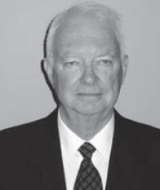Robert K. Carnegie

Robert Carnegie was awarded the degree of Doctor of Science, honoris causa, at the 9:30 a.m. ceremony on Tuesday, June 10, “in recognition of outstanding contributions to the study of particle physics and his extraordinary service to Carleton University.”
Carleton Prof. Robert Carnegie taught in the Physics department for 30 years, before retiring in 2005. While at the university, he supervised many graduate students and researchers, as well as being involved in significant international collaborations that put Carleton University at the centre of cutting-edge research.
The Toronto-born scientist developed and led the joint Carleton-NRC experimental particle physics research group in carrying out two large international experimental projects. From 1982 to 2003, Carleton participated in the OPAL experiment, a large multinational collaboration that built and operated the OPAL detector and experiment at the Large Electron Positron (LEP) accelerator at the CERN Laboratory in Geneva.
The LEP experimental program led to remarkable improvements in the testing and understanding of particle physics, the theory describing the basic constituents and forces in nature. The joint Carleton-NRC team was also responsible for designing and building sophisticated particle detectors at Carleton which have made important contributions on international projects.
Dr. Carnegie served as spokesperson of the Canadian OPAL team at CERN for over 20 years, the director of the Institute of Particle Physics of Canada (IPP) for seven years, and has been the Canadian representative on the International Committee for Future Accelerators (ICFA).